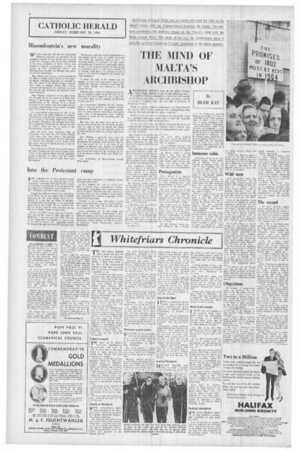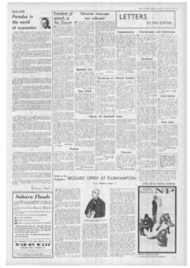Page 4, 28th February 1964
Page 4

Report an error
Noticed an error on this page?If you've noticed an error in this article please click here to report it.
Tags
Share
Related articles
'let Us Generously Open Our Hearts'
The Crux Of Cross Purposes
Letters To The Editor
The Maltese Clergy Loyal To Britain
Plain Chant
PR OMISES or 1802 MU St r irri
I N
of a better airing in Malta than in England. Gentle and forgiving personal contact, he has the hard Roman mind. Pastoral passion and juridical logic strive for the mastery. lie is, above all, a man who says his prayers. But does his undeniable paternity at times overspill to paternalism?
Wild men
Both protagonists suffer from their own "wild men". On the Labour side, vicious invective and hardly veiled threats of mass vio
lence. In t' • Churc.:., certain priests whose sermons lapse to political diatribes. Even His Grace has been heard to say: "We have 800 priests: I can't control the lot of them day and night".
Some of the shocking insults hurled at the Church by Labour spokesmen would lose all symsithy for any political party in this country. On the other hand, some of the island's too many priests tend to become-careerist, to live in a clericalcaste, to radiate clericalism. If just a few more would go to the missions, a lot of the air might be cleared.
But to offer this as an overall picture of the Maltese clergy would be a pretty gross travesty. There are many forward-looking priests closely concerned with social welfare: many youngsters among them full of a sense of the Church poor and ministering: many hard working pastors, and many prepared to give Mintoff a very fair crack of the whip.
The Archbishop has repeatedly made it clear that he is willing to meet Dom Mintoff to negotiate their differences. Mintoff refuses to go to the Archbishop's house as a point of prestige. The Archbishop agrees to meet him in Rome. Mintoff says it must he in secret. The Archbishop agrees again..
Then Mintoff says the Church must first lift the ban on his paper and his meetings. His Grace replies that these are precisely the matters to be negotiated, Mintoff won't have it and the meeting falls through.
Objections
The prospect of independence raises no questions for the Church. The Nationalist Government wants it now, within the Commonwealth. Mintoff wants it now, outside the Commonwealth. The centre parties want to delay it till Malta is better prepared. In this strictly political matter, the Church stays neutral.
As the Archbishop sees it. Mr. Mintoff has to be opposed on other grounds. They include the following:
I. He wants public morality based on the criterion. not of religious belief, hut on standards acceptable to the society of Western Europe, .
2. He wants to introduce civil marriage. This can only mean that he wants to introduce it for Catholics. In this matter, Maltese civil law is canon law, and nonCatholic civil marriages are recognised already. (The Spanish formula could be adopted for lapsed Catholia — toleration without recognition).
3. Mr. Mintoff proposes a law to make religious instruction compulsory in State schools, but with a proviso that parents have the right to withdraw their children' from it if they wish. There is no law at all about the matter at the moment. because it hardly seems necessary. What is the purpose of formally Mtroducing a law of this kind in a Catholic society — save to encourage the parents to opt out?
4. When the island's nonCatholics are only a tiny handful of temporary residents, why does Mr. Mintoff lay such stress on "equal treatment for all denominations"? Is this another lever to subdue the Church's influence?
The record
5. He seeks penalties against undue influence in elections. Fair enough: unless the real motive is to suppress the Church'S inalienable right to pronounce on moral issues even in political questions. Past history, in the Archbishop's view, suggests that it is.
(This right of the Church may seem, in the English climate, to be more theoretical than practical. But if, for example, the Communist Party were very powerful here. the English Bishops would certainly have to forbid the faithful to vote for it).
6. As the natural moral authority in the Maltese cornmunity. the Church insists on being associated with censorship of communications media. Mr. Mintoff seeks to unhinge this. 7. If these objections are said to he based on suspicion, Church leaders will point to the Labour Party's record when it was in office.
Many instances are quoted: the refusal to let the parish priests answer attacks against them on the radio; physical violence against other parties: an alleged spy system and police state methods land later on, threats of "people's courts"); the transfer of a headmistress Who, in school, defended the Archbishop. And so on.
I have stood in a street in Valetta and talked to a Labour supporter, the tears running down his face, torn between desire for the sacraments and a conviction that Malta needs Dom Mintoff for survival. In the face of this, the Church's objections may sound sternly juridical. But their logic is hard to deny.
Three last points. First if there are abuses in the MalteSe Church, reforms may be expected from within, especially in view of Vatican 11.
Secondly as our editorial said last week. Britain ought not to be able to lift up her head if she denies to the George Cross Island the economic aid that would remove so much of the heat and help to disentangle religious from political issues.
Thirdly there is still no reason why Malta should not stay Catholic and also enjoy Dom Mintoff's services in one form or another. The choice is a personal one. We pray he will make it.
blog comments powered by Disqus











